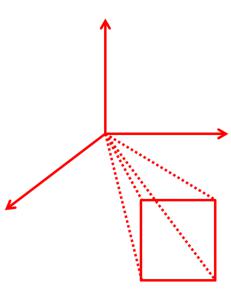Sermon preached 10/22/2011 at Burke UMC LifeSign contemporary service
Text: Matthew 13:1-9
I spent the summer of 2000 in a village called Dolores Hidalgo in southeastern Mexico. It was a place where people seemed to have everything even though they had nothing. Every morning at about 5:00, we would get up and go out to the cornfields to chop out the weeds with machetes in order to get done before the heat of the day. Breakfast was a cold corn meal stew called posol that we drank in the fields out of a plastic bag. Lunch and dinner were beans and corn tortillas. Every afternoon, we jumped in the river with our clothes on to bathe and do laundry at the same time. Each evening, we played soccer on the village field. It was one of my best summers. I have often longed to get back to Dolores Hidalgo.
It’s easy to romanticize the lives of the villagers there. They didn’t have electricity, which meant no refrigeration. No milk, no eggs, no cheese. The village store had sodas but they were all lukewarm. The local school only went up to maybe the 3rd grade and the nearest town was a full day’s journey on a footpath through the mountains. If villagers got sick, they either got better or they didn’t. But they weren’t sad or desperate the way that I had thought poor people were supposed to be. They really laughed a lot, especially at the random gringo who was bumbling around in their midst (I was officially stationed there as a volunteer “human rights observer” during the low-intensity civil war between the Zapatista guerrillas and the Mexican army).
Whatever else is true about Dolores Hidalgo, I imagine that its villagers have lot less confusion than people in my world about the fact that God is the source of all life. In our world of electricity and air-conditioning and smart phones, it can seem like we are the ones who create life since babies are born in hospitals and food comes from grocery stores. When we’re surrounded by gadgets that people have made, even though they originally come from raw material in creation, it’s easy to forget that there’s a God holding the world in balance. People who aren’t as engulfed in technology spend more time looking at and thinking about things that only God could have made like the sky, the river, the trees, the corn, and the beans. In a world where you have no choice but to depend on God for everything, it’s not as hard to see that God is a generous sower.
 In our world, we do gardening a lot differently than God does in the parable of the sower. When you buy seeds in the store, it says on the package how fair apart to plant the seeds, how deep to plant them, how much sunlight they need, how much water. I try to follow the package pretty closely to maximize my chances of success. How many of you throw your seeds on the sidewalk? What about on top of the rocks? How about among the thorns? Of course we don’t do that and we shouldn’t because it would be wasteful. Well, that’s one basic difference between God and us. God is willing to be wasteful and throw His seeds even on top of the concrete where they’ll get eaten by birds since there’s a tiny chance that they’ll find a way into a crack to grow. God can make life grow anywhere. How many of you have ever been hiking on a mountain and seen a tree growing out of the side of a rocky cliff? That’s the kind of thing God likes to do because He loves to throw His seeds everywhere.
In our world, we do gardening a lot differently than God does in the parable of the sower. When you buy seeds in the store, it says on the package how fair apart to plant the seeds, how deep to plant them, how much sunlight they need, how much water. I try to follow the package pretty closely to maximize my chances of success. How many of you throw your seeds on the sidewalk? What about on top of the rocks? How about among the thorns? Of course we don’t do that and we shouldn’t because it would be wasteful. Well, that’s one basic difference between God and us. God is willing to be wasteful and throw His seeds even on top of the concrete where they’ll get eaten by birds since there’s a tiny chance that they’ll find a way into a crack to grow. God can make life grow anywhere. How many of you have ever been hiking on a mountain and seen a tree growing out of the side of a rocky cliff? That’s the kind of thing God likes to do because He loves to throw His seeds everywhere.
This is the primary message of the parable of the sower. When we read this parable in a world that doesn’t believe in generosity, we completely ignore what the story has to tell us about God’s extravagance as a sower. Our our eyes immediately skip over to the descriptions of the types of soil that represents whether the seed of God’s word is received or not. Are we too rocky? Is our heart filled with too many thorns? How many more hours a week should we budget to prove to God that we’re worthy recipients of His seed?
When we try moralize this parable and make it about something other than God’s purposely wasteful goodness, it’s symptomatic of a lack of fertile soil in our hearts. Having fertile soil for the seed of God’s word means being able to see the world as it really is: a fertile, abundant place soaked with God’s grace. When God’s word is unable to grow fruit in our hearts, it’s because some obstacle in our hearts has trapped us in an economy of scarcity rather than God’s economy of abundance. Jesus describes three types of obstacles in the parable.
He says that the seed that gets thrown on the path and eaten by birds is like when a heart has received the word of God but Satan immediately poisons it. This is the kind of thing that happens when people use their “faith” to fulfill an ulterior agenda. Maybe it serves their pride by giving them a reason to put themselves above other people. Slave owners in centuries past twisted up the Bible to justify their sin, or men use scripture to justify abusing their wives. When someone’s heart is poisoned this fundamentally, God’s seed is killed almost immediately.
A second way that the seed’s growth is impaired is when it falls on the rocky soil where its roots can’t grow deep. To me, this allegorically illustrates what happens to people who are in love with feeling a spiritual high but aren’t interested in the patient, boring process of deepening their relationship with God. Maybe you go on a mission trip and have a mountaintop experience or you pour your heart in worship each weekend, but the rest of your life doesn’t change at all. If it’s all about the feeling, the seed of God’s word is going to wither and die.
The third way that the seed won’t grow is if it falls amidst the thorns that Jesus describes as worldly anxieties. Our world is filled with so many should’s and have-to’s. The harder we try to prove ourselves through our careers and our dedication to our children’s activities, the more we choke the word of God in our hearts and keep it from bearing fruit. When we add religion to a tall stack of things we are doing to prove our worth, it has little if any spiritual benefit. It’s only when we start from the premise of the extravagant goodness of God that any of whatever else we do in life can bear fruit.
God has given us spiritual disciplines to use to break up our soil and compost it so that His seeds will be fruitful. But the only way these disciplines will help us is if we are engaged in them for the purpose of opening our eyes to the goodness of God and not in order to “earn” anything from a Creator who only offers gifts. God’s fruit grows in us in direct proportion to our awareness of the extravagance of His generosity.











